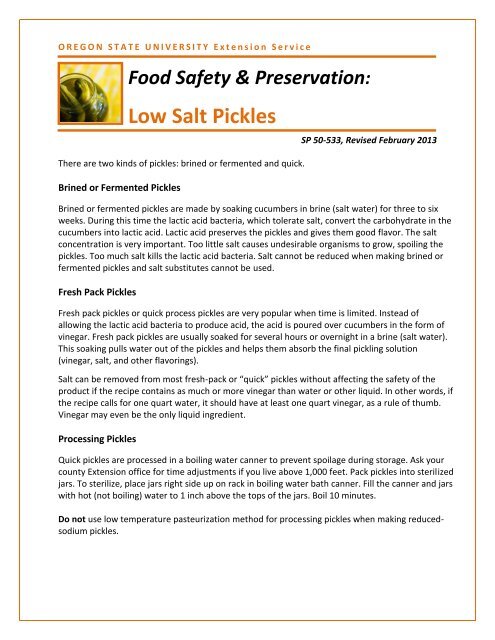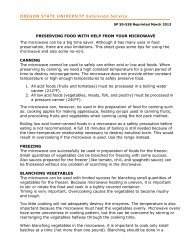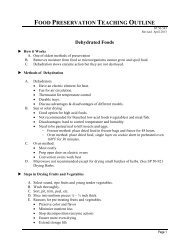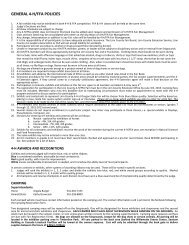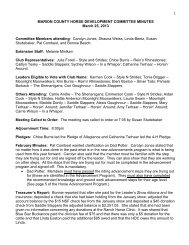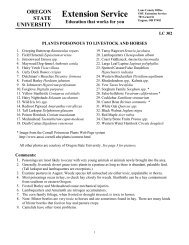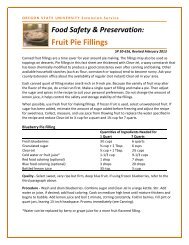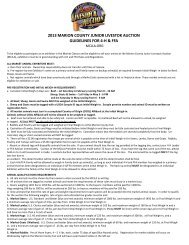Low Salt Pickles - Oregon State University Extension Service
Low Salt Pickles - Oregon State University Extension Service
Low Salt Pickles - Oregon State University Extension Service
Create successful ePaper yourself
Turn your PDF publications into a flip-book with our unique Google optimized e-Paper software.
O R E G O N S T A T E U N I V E R S I T Y E x t e n s i o n S e r v i c e<br />
Food Safety & Preservation:<br />
<strong>Low</strong> <strong>Salt</strong> <strong>Pickles</strong><br />
There are two kinds of pickles: brined or fermented and quick.<br />
Brined or Fermented <strong>Pickles</strong><br />
SP 50-533, Revised February 2013<br />
Brined or fermented pickles are made by soaking cucumbers in brine (salt water) for three to six<br />
weeks. During this time the lactic acid bacteria, which tolerate salt, convert the carbohydrate in the<br />
cucumbers into lactic acid. Lactic acid preserves the pickles and gives them good flavor. The salt<br />
concentration is very important. Too little salt causes undesirable organisms to grow, spoiling the<br />
pickles. Too much salt kills the lactic acid bacteria. <strong>Salt</strong> cannot be reduced when making brined or<br />
fermented pickles and salt substitutes cannot be used.<br />
Fresh Pack <strong>Pickles</strong><br />
Fresh pack pickles or quick process pickles are very popular when time is limited. Instead of<br />
allowing the lactic acid bacteria to produce acid, the acid is poured over cucumbers in the form of<br />
vinegar. Fresh pack pickles are usually soaked for several hours or overnight in a brine (salt water).<br />
This soaking pulls water out of the pickles and helps them absorb the final pickling solution<br />
(vinegar, salt, and other flavorings).<br />
<strong>Salt</strong> can be removed from most fresh-pack or “quick” pickles without affecting the safety of the<br />
product if the recipe contains as much or more vinegar than water or other liquid. In other words, if<br />
the recipe calls for one quart water, it should have at least one quart vinegar, as a rule of thumb.<br />
Vinegar may even be the only liquid ingredient.<br />
Processing <strong>Pickles</strong><br />
Quick pickles are processed in a boiling water canner to prevent spoilage during storage. Ask your<br />
county <strong>Extension</strong> office for time adjustments if you live above 1,000 feet. Pack pickles into sterilized<br />
jars. To sterilize, place jars right side up on rack in boiling water bath canner. Fill the canner and jars<br />
with hot (not boiling) water to 1 inch above the tops of the jars. Boil 10 minutes.<br />
Do not use low temperature pasteurization method for processing pickles when making reducedsodium<br />
pickles.
Zucchini Mustard <strong>Pickles</strong><br />
4 quarts (about 6 lbs.) medium size zucchini, sliced<br />
1½ cups (about 1 lb.) small white onions, sliced<br />
2 large garlic cloves<br />
⅓ cup salt<br />
2 quarts (2 trays) ice, crushed or cubes<br />
3½ cups sugar<br />
1½ tsp. tumeric<br />
1½ tsp. celery seed<br />
2 Tbsp. mustard seed<br />
3 cups white vinegar<br />
Yield: 7 pints<br />
Wash zucchini thoroughly using a vegetable brush; drain on rack. Slice unpeeled zucchini into ⅛<br />
inch to ¼ inch slices; discard ends. Add onions and garlic.<br />
Add salt and mix thoroughly. Cover with crushed ice or ice cubes. Let stand 3 hours. Drain<br />
thoroughly; remove garlic cloves.<br />
Combine sugar, spices, and vinegar. Heat just to boiling. Add drained zucchini and onion slices and<br />
heat 5 minutes.<br />
Pack hot pickles loosely into sterile, hot pint jars and cover with hot liquid to ½ inch from top.<br />
Adjust jar lids.<br />
Process in a boiling water canner for 5 minutes (start to count processing time as soon as water in<br />
canner returns to boiling). After processing, take canner off heat. Remove lid. Wait 5 minutes<br />
before removing jars.<br />
Reduced Sodium Sliced Sweet <strong>Pickles</strong><br />
3 pounds pickling cucumbers (3-4 inch)<br />
Brining solution: 1 quart distilled white vinegar (5%)<br />
1 Tbsp. canning or pickling salt<br />
1 Tbsp. mustard seed<br />
½ cup sugar<br />
Canning Syrup: 1⅔cups distilled white vinegar (5%)<br />
3 cups sugar<br />
1 Tbsp. whole allspice<br />
2¼ tsp. celery seed<br />
Yield: 4-5 pints<br />
Wash cucumbers. Cut into ¼ inch slices discarding blossom end. In a large kettle, mix the<br />
ingredients for the brining solution. Add the cut cucumbers. Cover and simmer until the cucumbers<br />
change color from bright to dull green (about 5-7 minutes). Drain cucumber slices. Fill jars, covering<br />
with hot canning syrup, leaving ½ inch headspace. Adjust lids and process pints 10 minutes in a<br />
boiling water canner. After processing, take canner off heat. Remove lid. Wait 5 minutes before<br />
removing jars.
<strong>Salt</strong>-Free Zucchini Dills<br />
6 pounds zucchini 3 Tbsp. dill seed<br />
2 cups celery, thinly sliced 2 cups cider vinegar<br />
2 cups onion, chopped 5 cloves garlic<br />
¼-½ cup sugar or honey<br />
Yield: about 10 pints<br />
To prepare zucchini, peel, seed and slice lengthwise into thin strips about ¼ inch thick and 4 inches<br />
long (makes about 3 quarts). Mix all vegetables together in large bowl. Put ice cubes over the top.<br />
Cover with a towel. Let stand at room temperature for about 3 hours. Drain. Combine sugar, dill<br />
seed and vinegar. Heat and stir constantly to boiling. Add vegetables and repeat to boiling. Pack<br />
hot, into sterilized jars, adding a piece of peeled, halved garlic per jar. Adjust caps. Process 5<br />
minutes in a boiling water canner. After processing, take canner off heat. Remove lid. Wait 5<br />
minutes before removing jars.<br />
<strong>Low</strong> <strong>Salt</strong> Kosher Dills<br />
8 pounds pickling cucumbers (5-6 inch) 1½ tsp. red pepper crushed<br />
12 heads dill 4½ cups water<br />
6 teaspoons dill seed 4½ cups vinegar<br />
3 cloves garlic, finely cut ¼ cup + 2 Tbsp. salt<br />
Yield: 6 quarts<br />
Wash cucumbers thoroughly, scrubbing with brush. Trim blossom ends. Drain. Slice lengthwise or<br />
into crosswise slices.<br />
Pack cucumbers into clean quart canning jars. To each jar, add 2 small heads fresh dill, 1 teaspoon<br />
dill seed, ½ clove garlic, and ⅛ teaspoon red pepper.<br />
Pour boiling brine of water, vinegar and salt over cucumbers in sterile jars, leaving ½ inch<br />
headspace. Adjust lids. Process in a boiling water canner 5 minutes. After processing, take canner<br />
off heat. Remove lid. Wait 5 minutes before removing jars. <strong>Pickles</strong> should be ready to eat in 6<br />
weeks or so.<br />
Note: If more brine is needed, mix in same proportion. If brine is too tart, add sugar. Do not add<br />
water.<br />
Source: OSU Master Food Preserver Program<br />
© 2012 <strong>Oregon</strong> <strong>State</strong> <strong>University</strong>. OSU <strong>Extension</strong> <strong>Service</strong> cooperating. OSU <strong>Extension</strong> <strong>Service</strong> offers educational programs,<br />
activities, and materials without discrimination based on race, color, religion, sex, sexual orientation, national origin, age,<br />
marital status, disability, or disabled veteran or Vietnam-era veteran status. OSU <strong>Extension</strong> <strong>Service</strong> is an Equal Opportunity<br />
Employer.


